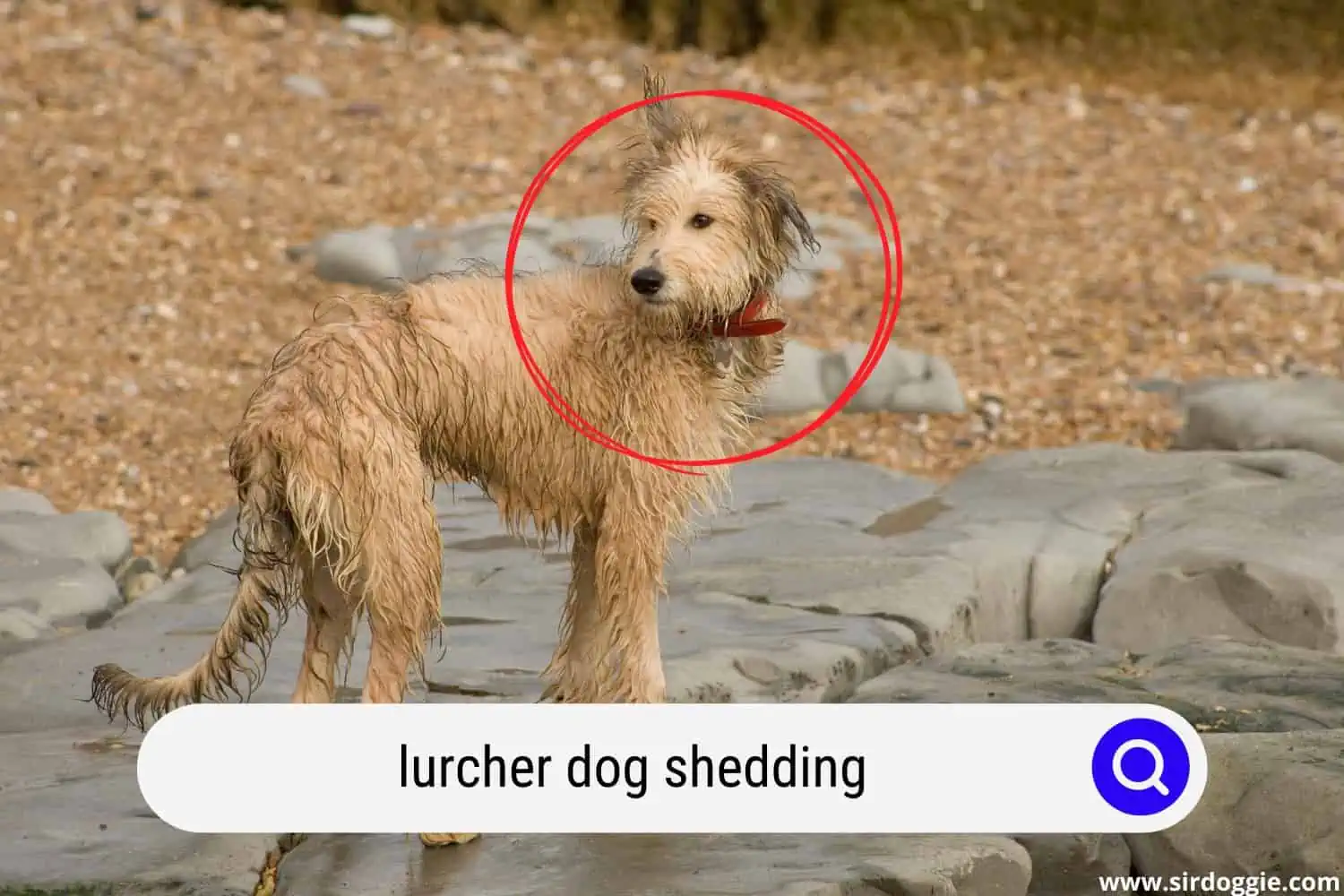Do Lurchers Shed? [ANSWERED]
Lurcher is a low-shedding dog with a short and easy to maintain coat. They do shed, though not nearly as much as heavier-coated dogs. They shed depending on the amount of hair they have.
Lurchers do lose some fur during seasonal changes like fall and spring, but overall they aren’t heavy shedders. Your Lurcher needs little maintenance and you need to deal with very limited shedding. You won’t see a huge amount of hair on your couch and floor.

Related Reading: A Whippet Lurcher Guide
Lurcher Breed Information
Lurcher is a mixed breed that came as a result of a crossing between a sighthound and some type of non-sighthound breed. Lurchers are primarily hunting dogs with greater tenacity and scenting ability. They are not recognized by any reputable kennel.
They are calm and affectionate dogs prized for their stealth and silence. The Lurcher is an independent thinker but intelligent and highly trainable. Early socialization is important to help prevent the development of timidity or aggression.
Lurchers are lean dogs and may have a rough or smooth coat. There is also a long-coated version of the breed that requires a little more brushing than the shorthaired variety.
At What Age Does Lurcher Start Shedding
Shedding is natural and all dogs do so. This is due to the essential growth and regeneration of hair. Lurchers are generally considered the low shedding dog breeds. Lurcher pups usually start shedding between 8-13 months.
Reasons Which Affect Lurcher Shedding
Although this breeder is a low-shedder, some long-coated versions of the breed may shed more. The abnormal heavy shedding can be a sign of an underlying health issue.
Let’s have a look at the various reasons which affect Lurcher shedding:
Change of season
Like all dogs, Lurcher’s natural hair growth cycle adapts to varied seasons. These dogs shed during weather changes, such as spring or autumn.
Poor nutrition
Poor nutrition is a major factor when it comes to excessive shedding in Lurchers. If these dogs are not given a healthy and balanced diet, their coat appears unhealthy and they may experience shedding.
Poor grooming
Lurchers truly are easy to care for. Minimal grooming is all it takes to keep your Lurcher looking its best. Though minimal, regular grooming is important for all dogs. Poor grooming results in poor coat conditions and excessive shedding.
If you are not brushing your Lurcher frequently enough or using incorrect brushes, this may damage your coat. Too much or very little bathing can cause Lurchers to shed their coats. Using the wrong shampoo can also contribute to Lurcher shedding.
Hormonal changes
Hormonal swings affect how your Lurcher sheds and you might not be able to control it. Hormonal imbalance in Lurchers may occur due to pregnancy, recent neutering or spaying, or female Lurchers going into heat.
Stress
Abnormal shedding in Lurchers may be a sign of stress. They may get stressed due to environmental change, separation anxiety, or some trauma.
Ticks and fleas
Fleas, ticks, or parasites may also result in noticeably high Lurcher shedding. Parasites make their skin itchy and uncomfortable.
If you observe that your Lurcher’s shedding has become unusually heavy, it is time to speak to a vet.
How To Deal With Lurcher Shedding
As a Lurcher owner, you need to understand that your Lurcher’s coats will need routine maintenance and minimal grooming to stay in good condition. It will also help to remove loose and dead hair from the coat.
Here is what you can do to manage Lurcher Shedding:
Regular brushing
Regular weekly brushing is the best way to keep your Lurcher’s coat shiny, clean, and healthy. It also reduces the amount of hair they drop around the home. The slight pressure applied while grooming also improves blood circulation, which is always a great thing.
Thoroughly brush your Lurcher’s whole coat with a soft bristle brush to remove all the dead hair. You will need to brush from the root of the hair to its tip or end.
Regular baths
Many people believe that regular bathing also helps control heavy shedding. This is a cost-efficient way that can help to loosen the dead hair. It is recommended to bathe your Lurcher no more than once a month. Overbathing is not recommended for these dogs.
You may consider bathing more frequently during the shedding season. Try to always test the temperature of the water before putting your Lurcher in. When bathing them, use a good quality pH-balanced shampoo and conditioner.
Healthy diet
Lurchers should be fed a healthy and balanced diet. You must ensure that your Lurcher gets good nutrition with a balance of Protein and Essential Fatty Acids. It is also important to ensure that this food is appropriate for Lurcher’s age range. This will keep your Lurcher’s coat in good condition.
If you observe a dull coat and abnormal shedding, try including fish oil and Omega 3 into your Lurcher’s diet. These nutrient supplements promote stronger hair follicles and skin elasticity. They are great for a healthy coat.
Exercise your Lurcher regularly
Regular walks or playtime can decrease the amount of hair falling inside the house as your Lurcher will be shedding some hair outside.
As most Lurcher coats go through shedding during the spring and summer, you can let your fur buddy shed most of its unwanted hair when you take them to the park.
Regular Vet Appointments
While healthy Lurchers shed normally, excessive shedding could be a symptom of an allergy or any other health issue. So getting your Lurcher checked by a qualified vet can rule out the possibility of any other underlying condition.
Vets can also guide you on what kind of diet to feed your Lurcher that can keep the coat healthy and reduce shedding.
Can I Shave My Lurcher?
There is no need to shave your Lurcher and it’s never recommended. Your dog’s coat is its natural insulating layer. If you shave your Lurcher, you are removing its natural protective layers and this can be damaging for your pooch. Here are some reasons why you shouldn’t shave your Lurcher:
- Your Lurcher won’t be able to regulate its body temperature
- Your Lurcher’s skin would be exposed to the sun’s harmful UV rays
- Shaving puts your Lurcher at a higher risk for heatstroke or they may suffer sunburn
- It can cause the hair to grow back improperly
- It may damage their hair follicles and lead to permanent bald patches on your Lurcher
Are Lurchers hypoallergenic?
Lurchers have a short smooth coat with limited shedding which needs little maintenance. They are not considered hypoallergenic dog breeds. Short-haired lurchers are especially good for allergy sufferers.
How to keep your home clean
Here are some tips that will help you keep your house fur-free.
- Vacuuming daily is one of the best ways to prevent Lurcher hair from building up. Vacuuming also decreases the doggie odor from becoming too strong in your home.
- Lurcher’s hair sticks with blankets, pillows, and sheets. You should clean all bedding at least once a week to reduce excessive hair build-up.
- Mop or sweep your floors regularly before hair build-up. Search for a pet hair removal broom with scratch-proof rubber bristles.
- Giving your Lurchers their designated bed. This will reduce the problem of dog hair on bedding and furniture.
- Lurcher owners might observe hair on tables and shelves. Dust these areas regularly to remove loose hair.

Conclusion
So, there you have it. Lurchers are loving, affectionate, and energetic dogs who will always keep you entertained with their amazing personalities. A well-trained Lurcher will always be good with children and other resident pets.
Maintaining a Lurcher won’t be tough at all if you give them regular exercise, a healthy diet, and weekly brushing. Lurchers do shed a little but not as much as other dog breeds.

Family Dog Expert Author
Hi there! I’m Stuart, a devoted dog lover and family dog expert with over a decade of experience working with our furry companions. My passion for dogs drives me to share my knowledge and expertise, helping families build strong, loving bonds with their four-legged friends. When I’m not writing for SirDoggie, you’ll find me hiking, playing with my beautiful dog, or studying music.